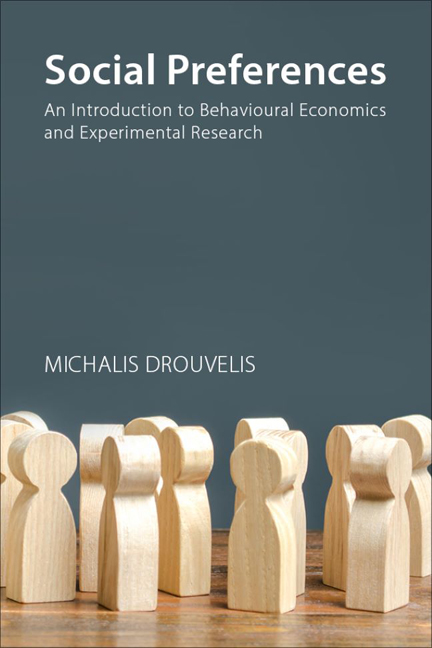Book contents
- Frontmatter
- Contents
- Preface
- 1 Introduction
- 2 Bargaining games
- 3 Trust and gift exchange games
- 4 Public Good Games I
- 5 Public Good Games II
- 6 Leadership
- 7 Public good games with sanctioning I
- 8 Public good games with sanctioning II
- 9 Cross-cultural experiments
- Appendix A Experimental instructions
- Appendix B Practical information
- Notes
- References
- Index
Appendix B - Practical information
Published online by Cambridge University Press: 22 December 2023
- Frontmatter
- Contents
- Preface
- 1 Introduction
- 2 Bargaining games
- 3 Trust and gift exchange games
- 4 Public Good Games I
- 5 Public Good Games II
- 6 Leadership
- 7 Public good games with sanctioning I
- 8 Public good games with sanctioning II
- 9 Cross-cultural experiments
- Appendix A Experimental instructions
- Appendix B Practical information
- Notes
- References
- Index
Summary
Introduction
The aim of this Appendix is to provide useful information about the practical aspects of conducting a laboratory experiment. The scientific process of running an experiment requires that the researcher goes through a number of important steps until the final paper is written up. In general, these steps include: (1) identifying a research question (and its motivation/added value relative to existing knowledge); (2) setting up the design of the experiment (i.e. how the research question can be addressed?) and formulating hypotheses (which can be based on economic/psychological frameworks and/or past empirical evidence); (3) preparing the practical aspects of running the experiment; and (4) collecting the data and writing up the paper. Our main focus in this Appendix will be to highlight some of the key elements and steps upon which the researchers place emphasis when they are actually preparing to conduct their experiments. We will discuss, in turn, the following four aspects: subject pool, context (of the instructions), recruitment/programming practices when running a laboratory experiment and possible design aspects that need to be decided when an experiment is in its design phase.
Subject pool
A first choice that researchers need to make before running an experiment is what their sample will be. To a large extent, the answer to this depends on the nature of the research question that is at hand. Typically, the most commonly used subject pool in laboratory experiment consists of university students. There are several advantages for using students as subject pools – as opposed, for example, to representative samples or professionals – which can be summarised as follows (for a more elaborate discussion on this issue, see Frechette (2017)).
1. Opportunity cost. The opportunity cost of students is lower compared to other subject pools such as professionals who normally receive relatively higher wages. Recruiting professionals or representative samples from the population may increase the budget needed for conducting an experiment substantially which may come at the expense of collecting less data (having implications about the power of the data and the reliability of the conclusions drawn from the experiment).
- Type
- Chapter
- Information
- Social PreferencesAn Introduction to Behavioural Economics and Experimental Research, pp. 163 - 170Publisher: Agenda PublishingPrint publication year: 2021

